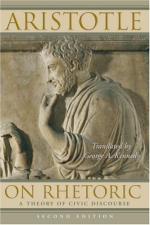
|
| Name: _________________________ | Period: ___________________ |
This test consists of 5 multiple choice questions, 5 short answer questions, and 10 short essay questions.
Multiple Choice Questions
1. Based on the information in Book I, Chapter1, for which side(s) of a question could rhetoric allow a person to make good cases?
(a) Neither side.
(b) The side that the person disagreed with.
(c) Both sides.
(d) The side that the person agreed with.
2. How did Aristotle differentiate between crime and punishment?
(a) Crime and punishment were remote.
(b) Crime was remote while punishment was immediate.
(c) Crime and punishment were immediate.
(d) Crime was immediate while punishment was remote.
3. Which tactic was not included as something that an epideictic rhetorician might use?
(a) Exaggeration.
(b) Competition.
(c) Comparison.
(d) Amplification.
4. As explained by Aristotle, what comprised good?
(a) Only one main thing.
(b) A few different things.
(c) Many different things.
(d) Only two main things.
5. In comparison to the other appeals, how much did Aristotle think that rhetoric resembled the dialectic in the logical appeal?
(a) Rhetoric most closely resembled dialectic in the logical appeal.
(b) Rhetoric resembled dialectic the least in the logical appeal.
(c) Rhetoric resembled dialectic the same in the logical appeal.
(d) Rhetoric resembled dialectic exactly in the logical appeal.
Short Answer Questions
1. As explained in Book I, Chapter 10, what did the general law refer to?
2. Why might a speaker use the ethical appeal?
3. How did Aristotle think a political orator should convince an audience of their plan?
4. How did Aristotle define that which is unpleasant?
5. How many forms did Aristotle think the emotional appeal could take?
Short Essay Questions
1. What benefits might ancient witnesses and recent witnesses have for legal rhetoric?
2. According to Aristotle, what had to happen in order for a person to be shameful or shameless?
3. What was considered pleasant and unpleasant for the forensic speaker?
4. What was Aristotle's description of the ethical appeal in rhetoric?
5. How was the emotional appeal defined by Aristotle?
6. Which causes of human action did Aristotle outline in Book I, Chapter 10, and which ones were voluntary?
7. In what way were contracts used by a legal rhetorician?
8. Which points of view could the law be observed by a legal rhetorician?
9. Why would rhetoric be used to help define individual beliefs?
10. How were friendship and enmity described by Aristotle?
|
This section contains 1,000 words (approx. 4 pages at 300 words per page) |

|




